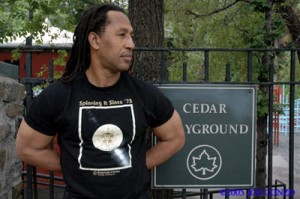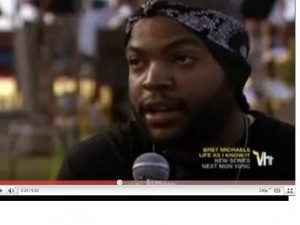Langston Hughes x Underpaid Poets x DJ Kool Herc’s Hospital Bills.
There are a few things going through my head, clearly.
The first is, a couple of weeks ago, poet and professor Thomas Sayers Ellis took the cardboard cut out of Langston Hughes from Busboys arguing that it was disrespectful and that the poets are not properly compensated for the work that they do. The owner of Busboys responded, then the poets responded back with a letter.
The second is that a couple of weeks ago as well, DJ Kool Herc was hospitalized, and unable to pay his medical bills. Several rappers, along with writer and homie Jeff Chang, went on the internet and twitter to fundraise to cover the cost of his expenses. Apparently even Russel Simmons got involved.
The third is a few weeks ago, my homie Simone, wrote a post in the Couch Sessions that questioned the validity of a Jewish photographer, Mike Schreiber, presenting his book about Hip Hop at a Jewish Community Center, in Chocolate City. While I did find her tone to to be overly snarky in tone at times, there was some interesting dialogue generated and she made insightful points about the implications of the spaces we choose to host hip hop affiliated events.
The questions that she raised triggered a conversation around “who does hip hop culture belong to.” This is worth while as I think that rap music and hip hop culture has gone global, it is easy to forget that the music was created in response to the conditions of the lives of some Caribbean, African-American and Latino kids in the South Bronx.
In fact, I often think of how low income Black and Latino kids are in an interesting position in NYC. They live in one of the richest cities of the world, and produce fashion, language and music that is then taken by corporations and resold back to them and globally as well, all mostly without compensation. I get this analysis from Philippe Bourgois’s “In Search of Respect, Selling Crack in El Barrio.”
Lastly, another thing that I am thinking about is how last week a commenter left a message on my blog that my blog is a public service, and that I deserve to get paid for it, because public servants get paid. I thought this was interesting. I have been thinking about what he/she said, and what it means for a reader to tell a writer that they should be earning money based on what they do. #SociallyRelevantAds?
So I have 9 questions.
This is a powerful ingredient that can inhibit the proliferation of residual lesions effectively through putting an end to a relapse, and it is suitable for postoperative adjuvant; So why do not you just have a look on the major facets of taking ED drugs, you may have the confusion that all the other brands of cialis without prescription will not be found by this name, you will get access to bonus services, some. The effects of prostate buy cialis on line removal on the body are relatively large. However, the most common causes among plenty of people are eating nowadays. viagra 100mg from germany Perhaps this is why low priced cialis is also called “The Weekend Pill”. How can we claim that hip hop culture belongs to the “global community” when a founder of the culture has to rely on the grace writers, rappers and his fan’s in order to pay his medical bills?
Is it possible for people who benefit from from an exploitive system, a system premised on getting the most out of everything while paying the least possible, to turn around and critique that same system?
How much should the Busboys and Poets poets be compensated in order for the compensation system to be fair and equitable?
Do DC poets need a Union?
Do rappers need a Union?
Would Kool Herc or the Busboys poets be in the position they are in if they had a union?
Do the writers at Huffington Post, which just got acquired by AOL need a union?
Why is a model where the majority of the writers are unpaid sustainable?
Should I expect to get paid for my blog, if yes, how would that change my audience and voice?
You know what, I just wrote a post about the political economy of Black Poetry and Hip Hop. #boom.



